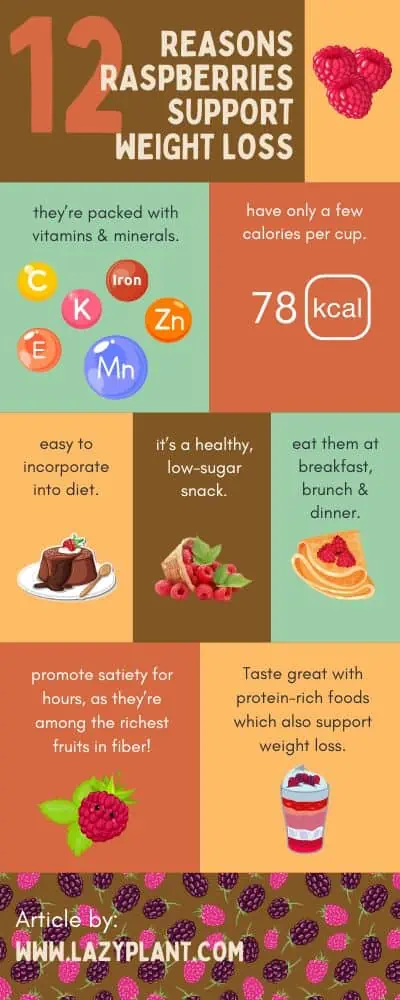Raspberries can be part of the Mediterranean diet for health and weight loss. They are nutrient-dense, low in calories, and high in fiber, making them ideal for those looking to maintain or lose weight.
Their high antioxidant content supports heart health, reduces inflammation, and promotes overall well-being. Including raspberries in fruit salads, yogurt bowls, smoothies, and snacks can easily fit into a Mediterranean-style eating plan.
Raspberry in the Mediterranean Diet
Raspberries (Rubus idaeus) are not native to the Mediterranean region and were not commonly consumed in ancient times by civilizations such as the Greeks, Romans, or Egyptians. They are believed to have originated in the cooler climates of Eastern Europe and Asia.
While raspberries were likely known in ancient Mediterranean cultures, they were not a staple food, unlike figs, grapes, olives, and citrus fruits, which were integral to the region’s agricultural and culinary traditions.
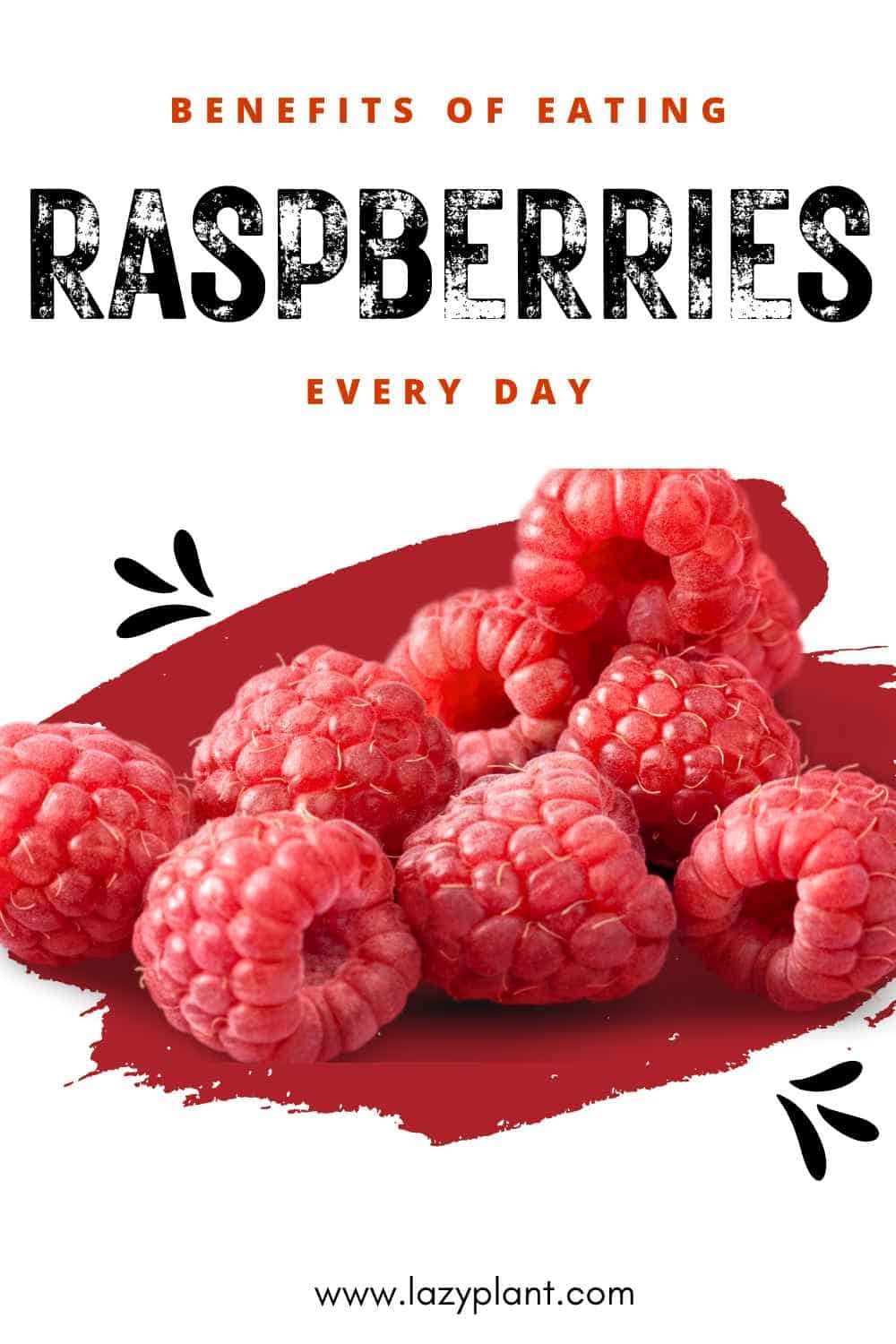
Raspberry Cultivation and History
The cultivation of raspberries is believed to date back to ancient Greece and Rome, but it was limited in scale. The earliest documented evidence of raspberries comes from the writings of the Greek physician Dioscorides in the 1st century AD, who mentioned the medicinal uses of the raspberry plant.[1]
However, the widespread cultivation of raspberries did not occur until the Middle Ages in Europe, particularly in northern regions with a cooler climate.
Raspberries were cultivated for both their fruit and medicinal properties. Over time, they became popular across Europe and spread to other regions, including the Mediterranean, through trade routes.
Raspberries in the Modern Mediterranean Diet
Though raspberries are not a traditional Mediterranean fruit, they fit well into the modern Mediterranean diet because of their nutrient density and health benefits. The Mediterranean diet emphasizes the consumption of whole, unprocessed foods, fruits, vegetables, and plant-based ingredients, making raspberries an excellent addition.
Raspberries are rich in:
- Antioxidants like anthocyanins, which help reduce oxidative stress.
- Dietary fiber, which aids digestion and promotes satiety, making them ideal for weight management.
- Vitamins and minerals, such as vitamin C, manganese, and potassium, which contribute to overall health.
Including raspberries in a Mediterranean-style diet can support health and weight loss due to their low-calorie count and high fiber content, helping to control hunger and promote healthy digestion.
Mediterranean Raspberry Recipes
While no traditional Mediterranean recipes specifically feature raspberries, modern adaptations can easily incorporate them. Here are some Mediterranean-inspired dishes and snack ideas that align with the diet’s principles:
- Greek Yogurt with Raspberries: Fresh raspberries can be added to Greek yogurt along with honey, nuts, and seeds for a healthy breakfast or snack.
- Raspberry and Walnut Salad: Mix fresh raspberries into a green salad with walnuts, feta cheese, and light olive oil, and balsamic vinaigrette for a nutrient-rich side dish.
- Mediterranean Raspberry Smoothie: Blend raspberries with Greek yogurt, almonds, and a splash of orange juice for a refreshing, antioxidant-packed smoothie.
- Raspberry-Almond Energy Bars: Make homemade energy bars with oats, almonds, and dried raspberries for a Mediterranean-friendly, portable snack.
These modern recipes take advantage of raspberries’ vibrant flavor while adhering to Mediterranean diet principles: focusing on whole foods, healthy fats (like nuts and olive oil), and minimal processing.
Benefits for Weight Loss
Calories
Above all, raw raspberries are good for weight loss because they’re pretty low in calories. They have only 52 calories per 100g. A whole cup has only 78 calories![1]
Other raspberry-based foods are much higher in calories, though. You shouldn’t consume them if you want to lose weight.
We lose weight when we consume fewer calories than we burn. So, eating lots of filling foods with a few calories is the best way to follow a diet plan long-term.
Sugar
Raw raspberries are pretty low in sugars. In fact, they have the lowest sugar content among most favorite fruits.
They have only 4.4 grams of sugar per 100g. Even a whole cup of raw raspberries has no more than 7 grams of sugar!
Even people with diabetes or people on keto can regularly consume them!
Do frozen raspberries support weight loss?
Only fresh, or unsweetened frozen raspberries are good for a hypocaloric diet for weight loss. Keep in mind though that many frozen raspberries contain added sugar. Avoid them if you’re on a diet.
Why do companies add sugar to healthy foods like raspberries, you might ask. Because sugar is cheap! It adds extra weight to the package!
Ideas to consume raspberries for dessert
Raspberries are great for satisfying your sweet tooth. They can be a healthy and delicious alternative in various high-calorie desserts and sweet treats. Here are some ideas:
Parfaits: Layer raspberries with Greek yogurt or cottage cheese for a wholesome parfait. Add a sprinkle of granola or nuts for crunch. Greek yogurt is rich in high-quality protein. High protein intake enhances weight loss. It promotes satiety and protects lean mass while dieting.
Frozen yogurt bark: Spread Greek yogurt on a baking sheet, top with fresh raspberries, and freeze. Break it into pieces for a refreshing and guilt-free treat.
Raspberry sorbet: Blend raspberries with a bit of honey or agave syrup, freeze the mixture, and churn it into a delightful sorbet.
Raspberry lemon cheesecake bites: Make mini cheesecake bites with a raspberry topping. Opt for a lighter cream cheese or Greek yogurt-based filling.
Vegan dessert ideas
Raspberry chia seed pudding: Mix raspberries into chia seed pudding for a fruity twist. Let it sit overnight for a delicious and nutritious dessert. Chia seeds are an excellent plant-based source of protein and omega-3s!
Smoothie bowls: Blend raspberries into a smoothie and pour it into a bowl. Top with sliced fruits, nuts, and seeds for added flavor and nutrition.
Dark chocolate raspberry cups: Melt dark chocolate and pour it into small cupcake liners. Drop a raspberry into each cup and let it set. A delightful combination of sweet and tart!

Raspberry almond bites: Combine crushed almonds with raspberries and form small energy bites. Perfect for a quick and healthy sweet snack.
Raspberry oat bars: Create a healthier version of fruit bars by incorporating raspberries into an oat-based mixture. Bake and enjoy guilt-free indulgence.
Raspberry coconut popsicles: Blend raspberries with coconut milk and freeze in popsicle molds for a refreshing and hydrating treat.
These healthy snacks contain between 150 and 250 calories per serving if they include raw raspberries. Actual calorie counts may vary based on specific recipes and portion sizes.
Always check the nutritional information for each dessert if you’re aiming for precise calorie intake.
Common desserts contain way more calories & sugar!
Consuming a cup of raw raspberries or a healthy raspberry dessert with no added sugar instead of a fattening snack can make a huge different to your long-term weight loww journey. Thet can contain up to 70% fewer calories than a typical dessert.
A small serving of favorite snacks can provide too many calories. Keep in mind that many <eat 2 or more servings per day!
- Brownie (1 square): 50-200 calories
- Ice cream (1 scoop): 100-150 calories
- Cheesecake (1 slice): 300-400 calories
- Apple pie (1 slice): 300-400 calories
- Chocolate cake (1 slice): 200-400 calories
- Doughnut (1 glazed): 200-300 calories
- Cupcake (1 standard): 150-300 calories
- Cinnamon rolls (1 roll): 300-500 calories
- Peanut butter cookie (1 medium-sized): 100-150 calories
- Chocolate mousse (1 serving): 200-300 calories
Benefits of a low-sugar diet for weight loss
A diet low in sugar and starch may have a beneficial effect on weight loss. It may improve glucose levels and insulin resistance. Also, it may decrease triglycerides, as well as visceral and subcutaneous fat.[2]
Sugar is empty calories. It contains no vitamins, minerals, or other health-promoting phytochemicals.
Consuming high amounts of added sugar may lead to insulin resistance, nonalcoholic fatty liver disease, inflammations, and increased uric acid levels. Hence, too much added sugar may increase the risk of cardiovascular disease, obesity, metabolic disease, and type 2 diabetes.[3,4]

It’s highly recommended to consume no more than 25 grams of added sugar a day. But, cutting down on sugar is very difficult. High amounts of extra sugar are added to sweets, sodas, and most highly processed products. Moreover, sugar interferes with the reward system of the brain. We always seek for more.[5,6]
Consuming fruits is the best way to satisfy your sweet tooth, though. The American Heart Association recommends consuming 4 servings of fruits a day.[7]
Fiber promotes satiety
Moreover, raspberries are good for weight loss because they’re particularly rich in fiber. Actually, they’re among the richest fruits in fiber.
They provide 6.5 grams of fiber per 100g. This amount of fiber is 23% of the Daily Value.
A cup of raspberries provides almost 10 grams of fiber or 35% of the DV.
Other raspberry products, including jams, cookies, juice, or raspberry yogurt contain negligible amounts of fiber.
Actually, raspberries are the richest common berries in fiber! They have about 3 times more fiber than strawberries or blueberries!
| fiber (g) per 100g | |
| raspberries | 6.5 |
| blackberries | 5.3 |
| cranberries | 3.6 |
| blueberries | 2.4 |
| strawberries | 2 |
Benefits of fiber for weight loss
Fiber supports weight loss because it controls hunger and reduces cravings for fattening foods! Fiber promotes satiety by slowing the absorption of nutrients, like fat. Hence, following a filling, high-fiber, low-calorie diet is key for weight loss.[8]
Foods high in fiber, protein, and water are the most filling ones.[9]
Fruits, vegetables, whole grains, and beans are common foods high in fiber.
Vitamin C
First, raw raspberries are particularly rich in vitamin C. They have 26 mg of vitamin C per 100g. A serving provides 39 mg of vitamin C which is 43% of the Daily Value.
The regular consumption of raspberries can help us meet our daily needs.
Actually, all berries are excellent dietary sources of vitamin C.
| vitamin C (mg per 100g) | |
| strawberries | 59 |
| raspberries | 26 |
| blackberries | 21 |
| cranberries | 14 |
| blueberries | 10 |
It’s vital to get high amounts of vitamin C to maintain a healthy body weight. Vitamin C helps burn fat and reduce waist circumference! Vitamin C is naturally present only in plant-based foods, though.
In addition, vitamin C enhances iron absorption, which also plays a vital role in weight loss.
Other raspberry products have less vitamin C
Vitamin C is very vulnerable to temperature though. Very high or low temperatures destroy vitamin C.
Thus, frozen raspberries have a lower vitamin C content than fresh berries. They have about 17 mg of vitamin C per 100g. So, frozen raspberries contain almost 35% less vitamin C than raw raspberries!
Other highly processed foods with raspberry have even less vitamin C. For instance, raspberry pie and syrup have only 14 mg and 9 mg of vitamin C per 100g, respectively.
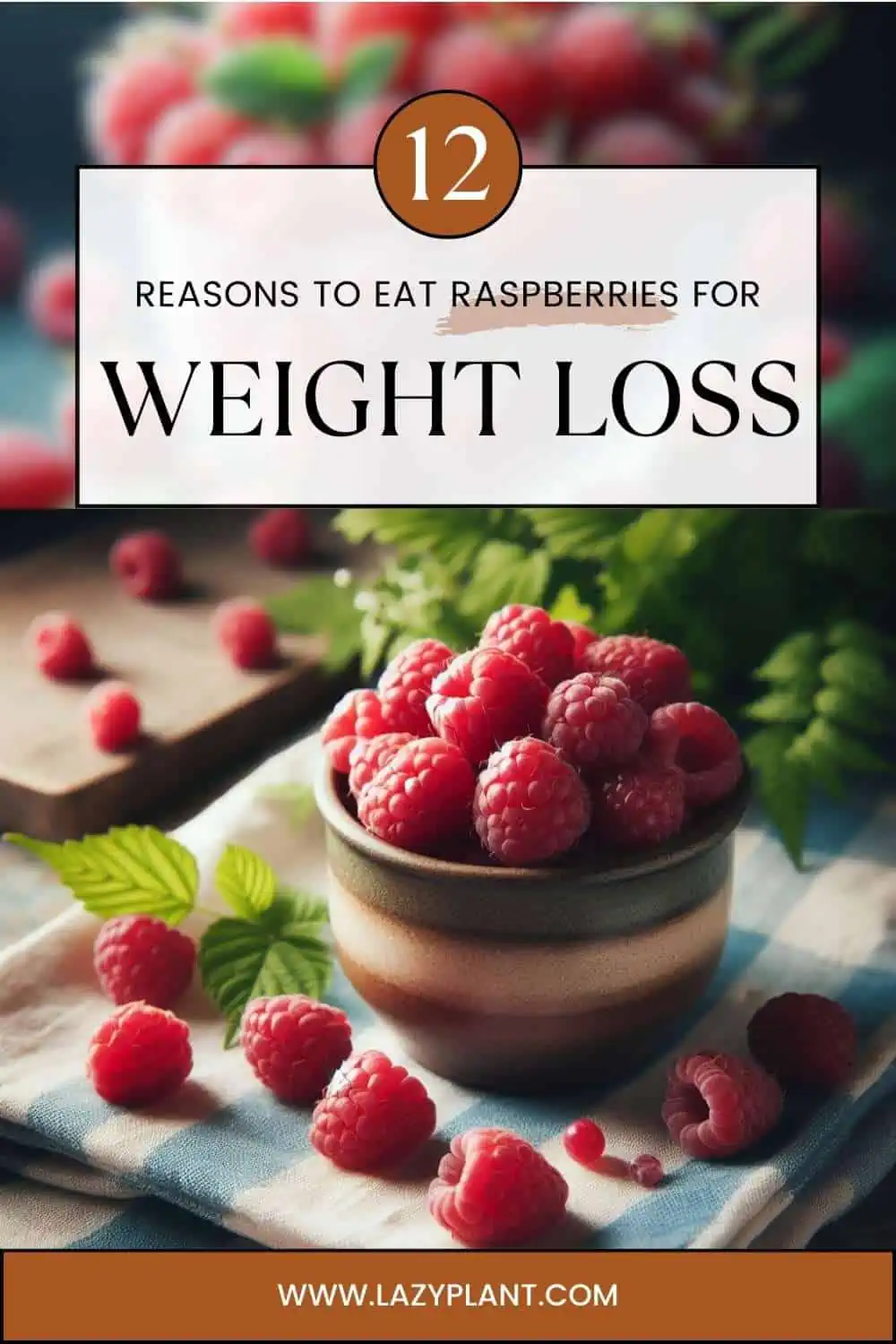
Vitamin E
Moreover, raspberries are good plant-based sources of vitamin E. They contain 0.87 mg of vitamin E per 100g. A cup provides 1.3 mg of vitamin E or 8.6% of the DV. Hence, raspberries can help us meet our daily needs of vitamin E.
Overweight people should get enough vitamin E. They have an increased risk of oxidative stress and insulin resistance. Vitamin E has a potent antioxidant and anti-inflammatory action. Also, it may improve blood glucose levels and induce weight loss.[10,11]
Vitamin K
Raspberries are good dietary sources of vitamin K as well. They contain 11.7 mcg of vitamin K per cup or almost 10% of the DV.
High vitamin K intake may help reduce body weight. Most noteworthy, it may improve body composition. Vitamin E helps reduce abdominal and visceral fat.[12]
Iron
Obesity is highly associated with iron deficiency. Poor iron status may lead to low energy levels and fatigue. A sedentary life prevents weight loss. Active people burn more calories. So, they can preserve a lean body year-round.[13,14]
Besides energy metabolism, iron is also involved in the synthesis of some hormones, amino acids, and collagen.[15,16]
Raspberries contain decent amounts of iron. Raw raspberries contain about 1 mg of iron per cup or 5% of the DV.
Red meat, liver, fish, vegetables, whole grains, seeds, and nuts are good dietary sources of iron. Beans, like lentils, soybeans, and chickpeas are particularly rich in iron as well.
Iron deficiency is the most common nutritional deficiency worldwide. But, a well-balanced diet can provide more than enough iron.
Manganese
There are many foods high in manganese. Raspberry is one of the best dietary sources. A cup of raspberries has about 0.85 mg of manganese. This amount is 37% of the DV.
High manganese intake is inversely associated with abdominal obesity and can protect, men in particular, against metabolic syndrome.[17]
Zinc
In addition, a cup of raspberries has about 0.63 mg of zinc. This amount is almost 6% of the DV.
High zinc intake may improve the effects of a restricted calorie diet on obesity. Zinc may reduce appetite, insulin resistance, inflammations, and other metabolic dysfunctions associated with obesity.[18,19]
Zinc deficiency is also pretty common worldwide. Among other health issues, zinc deficiency may also increase the risk of obesity![20]
In fact, many obese people may benefit from taking zinc supplements. High doses of zinc may revert obesity-related metabolic dysfunctions.[21]
Phosphorus
Also, raspberries have decent amounts of phosphorus. A cup provides 43 mg of phosphorus or 6% of the DV.
Consuming a wide variety of foods with phosphorus is important for weight loss. Phosphorus helps decrease body weight, Body Mass Index (BMI), and waist circumference. It’s crucial for burning belly fat.[22]
Above all, phosphorus supports weight loss because it increases energy expenditure after a meal.[23]
Also, it plays a key role in satiety. Hence, phosphorus helps follow a hypocaloric diet long-term.
Effects of Ketone
Raspberry ketone is an aromatic compound found within raspberries and other red fruits. It has been studied for its potential benefits on weight management.[24,25]
It is believed to have benefits on weight loss as well as other metabolic disorders due to its effects on balancing serum glucose levels, anti-inflammation, and antioxidant process.
Also, raspberry ketone appears to help burn belly fat, as it activates lipid metabolism. Even raspberry juice may prevent fat accumulation.[26,27]
You can get high doses of raspberry ketones from supplements as well.
However, as long-term studies for the intake of high dosages from supplements haven’t been conducted, it’s preferable to regularly consume raw raspberries or other red fruits in order to get ketone from the diet.[28]
Not all raspberry products support weight loss!
Prefer whole fruits with a low sugar content. Avoid dried fruits, fruit juices, or processed products with added sugar. They’re particularly high in sugars and calories. For instance:
- raspberry syrup has 91 calories per 100g.
- raspberry pie has about 222 calories per 100g, or 304 calories per piece.
- cookies filled with raspberry jam have 400 calories per 100g, or 100 calories per serving.
- nonfat raspberry-flavored Greek yogurt has 81 calories per 100g.
Dried berries and berry juices have too many calories as well. You should avoid their regular consumption.
You should avoid sweetened frozen raspberries, raspberry syrups, jams, pies, cookies, or any other raspberry sweet. As these raspberry products contain high amounts of added sugar, they might have disadvantages for weight loss and even health.
Raspberries vs other fruits for weight loss
Actually, all fruits can be part of a healthy, well-balanced diet. Even avocados support weight loss although they are particularly high in calories.
Raspberries are among the fruits with a pretty low sugar and calorie content, though. What food you should eat it’s a matter of preference.
| Fruit | Calories | Sugar |
| Watermelon | 46 | 9 |
| Strawberries | 49 | 7 |
| Cranberries (fresh) | 51 | 4 |
| Grapefruit | 52 | 8 |
| Peach | 59 | 13 |
| Papaya | 59 | 12 |
| Plum | 60 | 16 |
| Kiwi | 61 | 13 |
| Orange | 62 | 12 |
| Blackberries | 62 | 7 |
| Raspberries | 78 | 7 |
| Pineapple | 83 | 16 |
| Blueberries | 84 | 15 |
| Cherry | 87 | 18 |
| Apple | 95 | 19 |
| Pear | 101 | 17 |
| Grapes | 104 | 23 |
| Banana | 105 | 14 |
| Mango | 107 | 24 |
| Avocado | 240 | 0 |
Berries in particular have a pretty low sugar content. People who dieting for weight loss could eat a serving every day as a healthy snack or dessert.
How to eat raspberries for a lean body?
As a tip, you should consume raspberries with protein-rich foods. A meal high both in fiber and protein is very filling. Such a meal or snack could keep you full for many hours with only a few calories!
Here are some ideas to enjoy raspberries with protein-rich foods for a quick and nutritious snack:
- Greek yogurt parfait: Low-fat Greek yogurt is an excellent high-quality protein source. Layer raspberries with Greek yogurt. Add a drizzle of honey or a sprinkle of granola for extra texture. Combining Greek yogurt with oats has huge benefits for weight loss.
- Cottage cheese bowl: Cottage cheese supports weight loss, as it’s low in calories and fat while it’s rich in complete protein. Mix raspberries into a bowl of cottage cheese. Top with half a handful of almonds or walnuts.
- Raspberry and turkey roll-ups: Roll up fresh raspberries in slices of lean turkey or chicken. This combination offers a mix of sweet and savory flavors.
Vegan snacks rich in protein
- Raspberry toast: Spread almond or peanut butter on whole-grain crackers, rice cakes, or a slice of bread. Top with fresh raspberries for a satisfying snack.
- Protein smoothie: Blend raspberries with a plant-based protein powder, plant-based milk, and a handful of spinach. This makes for a quick and protein-packed smoothie.
- Raspberry and quinoa salad: Toss raspberries into a quinoa salad with vegetables. Add chickpeas or grilled chicken for added protein.
These ideas not only make for a delicious snack but also offer a good combination of protein, fiber, and antioxidants. A diet low in antioxidants, which are found abundant in fruits and vegetables can lead to chronic low-grade oxidative stress, which is another common reason for obesity!
Adjust portion sizes based on your nutritional needs and preferences.
How many raspberries can I eat a day while dieting?
The number of raspberries you can eat in a day while dieting depends on various factors such as your overall caloric intake, nutritional needs, and the specifics of your diet plan. In order to lose we should consume fewer calories than we burn.
However, raw raspberries contain only a few calories. Healthy people can even eat 2 cups of raw raspberries a day. Still, this amount has fewer than 160 calories!
Eating high amounts of raw raspberries has beneficial effects on health. They aid in postprandial glycemic control and insulin sensitivity.[1,2]
Avoid consuming frozen raspberries with added sugar, raspberry juice, or any raspberry snack with added sugar (e.g. pies, jams, cakes) if you’re on a diet.
If you insist on consuming such foods, at least be mindful of portion sizes. Treat them as a sweet, not as a healthy snack.
Can people with diabetes eat raw raspberries?
Although raspberries are low in sugar, people with diabetes should be very cautious with portion sizes. They could eat a cup of raw raspberries during the day as part of a well-balanced diet. But, it’s preferable to consume only half a cup as a sweet treat per day.[3]
In any case, people with health problems should consult their physician before changing their diet.
What are the dangers of eating too many raspberries?
Eating 1–2 cups of raw raspberries a day is considered pretty safe for most people.
However, you better consult your physician before consuming too many raspberries. High amounts of raspberries may have potential dangers for some people.
Some of the possible dangers of consuming too many raspberries are digested issues, allergic reactions, and kidney stones.

Gradually increase fiber
Firstly, consuming too many raspberries at once may cause digestive issues in some people. Raw raspberries are particularly high in fiber. Just a cup can provide up to 35% of the daily value!
Certainly, it’s good for you to eat foods high in fiber. Diets high in fiber have been associated with a decreased risk of obesity and metabolic disease.
However, people who follow a diet poor in fiber could experience bloating, gas, constipation, or even diarrhea when suddenly eat a meal high in fiber. Gut microbiota in the body needs time to adjust to high-fiber intakes.
Allergic Reactions
Raspberries can cause allergic reactions in some people. Those who are allergic to other fruits should be more mindful. Common symptoms of allergic reaction can include skin rash, swelling of the face or throat, or breathing difficulty.
Prefer organic products
Raspberries may have pesticide residues, as often treated with pesticides that may be dangerous to our health. Whenever possible, prefer consuming organic produce. Always wash thoroughly raw raspberries and other fruits and vegetables before consuming them. Water may not be enough, though. Better to wash groceries with this homemade, chemical-free solution!
May cause kidney stones
Furthermore, people with a history of kidney stones better avoid consuming too many raspberries. They’re considered high oxalate fruits. These compounds are naturally present in some foods. When consumed in high amounts, they contribute to the formation of kidney stones. A cup of raspberries has 48 mg of oxalate.[5]
Spinach is the richest common food in oxalate. That’s why we shouldn’t consume it every day, despite its superior nutritional value. Even so, spinach is one of the most beneficial foods for weight loss!
Can Raspberry Ketone be dangerous?
Raspberry ketone is an aromatic compound found naturally in red raspberries. Also, it is widely used as a supplement for weight loss. However, according to recent studies, extremely high dosages from supplements may cause adverse effects.[6,7]
The established threshold of toxicological concern of raspberry ketone is 1.8 mcg per day. Dietary supplements may provide 50–250 times this dose, or even more!
On the other hand, raspberries have up to 0.43 mg of ketone per 100g. A cup provides 0.645 mg or 35% of the maximum safe dose. Even eating 2 cups of raspberries a day won’t exceed the maximum safe dose.
When should I Eat Raspberries for Weight Loss?
As a Snack
The best time of the day to eat raw raspberries for weight loss is before a high-calorie meal or at dinner. As raspberries are a super filling food, they’ll help us consume fewer calories in total.
Also, raspberries can satisfy your sweet tooth. They’re great as a dessert.
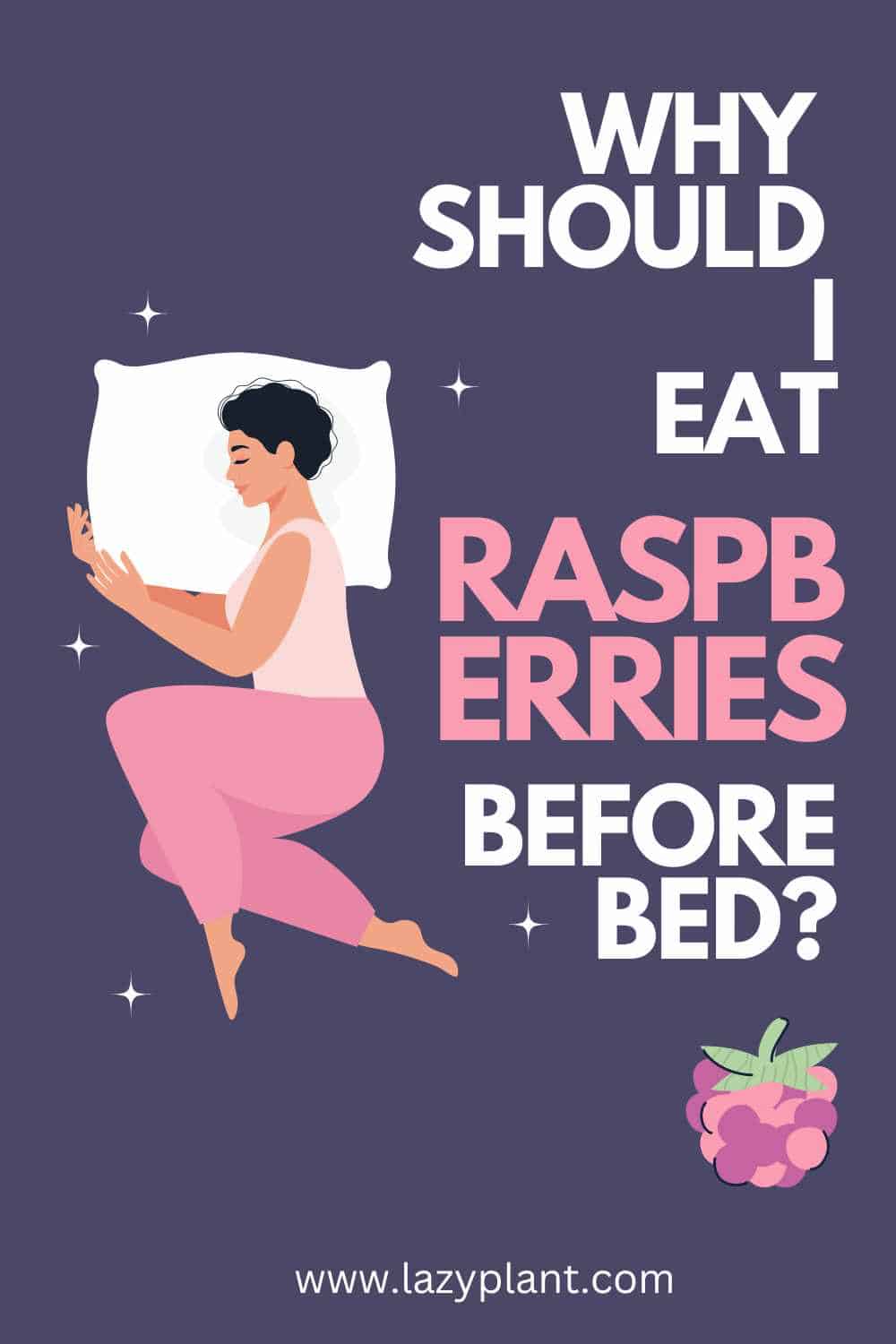
At Dinner
Fiber has been linked to high-quality, restorative sleep with fewer arousals. A serving of raspberries provides around 35% DV.[21]
Vitamin C in raspberries plays a beneficial role in daytime sleepiness, restless legs syndrome, sleep apnea, and insomnia, while vitamin E (9% DV) improves insulin sensitivity, controls glucose levels, improves metabolic profile, and plays a beneficial role in sleep disorders.[22]
Folate (8% DV) and potassium (7% DV) in raspberries could also help people with sleeping problems.[23,24]
Most people fail to consume the recommended daily intake of potassium. Potassium deficiency is common among people who follow the standard American diet.
Also, copper (15% DV) in raspberries seems to affect sleep-activity cycles, as it’s highly concentrated in the brain. Especially in the locus coeruleus area, which mediates these cycles! In this area, copper concentrations are around 10 times higher than in other areas of the brain.[25]
Normal magnesium levels have beneficial effects on sleep quality. Magnesium affects sleep onset latency, snoring, sleep duration, early morning awakening, and daytime falling asleep. A cup provides about 8% of the Daily Value![26]
Iron deficiency is the most common micronutrient deficiency worldwide! Among other health issues, it has also been associated with an increased risk of obesity and sleep disorders. A cup provides 6% DV. Raspberries are excellent plant-based sources of iron.[27]
In addition, anthocyanins in raspberries seem to play a beneficial role in anxiety and depression, as well as insomnia, while resveratrol may support a good night’s sleep and improve obstructive sleep apnea. It has neuroprotective properties and seems to be a potent regulator of sleep-wake rhythms.[28]
I eat only fresh raspberries in the evening. High amounts of added sugar at dinner may affect sleep quality.
After Exercise
Eating raspberries after a workout offers a range of benefits that support both recovery and long-term athletic performance.
Raspberries are packed with polyphenols and bioactive compounds, particularly ellagitannins and anthocyanins, which provide powerful anti-inflammatory, antioxidant, and antimicrobial properties. These compounds boost the immune system, reducing the likelihood of viral infections that can hinder training routines.[29,30]
Resveratrol, another key antioxidant found in raspberries, has shown antiviral effects, particularly against respiratory infections like influenza, making them a valuable addition to an athlete’s post-exercise diet.[31,32]
By enhancing immunity, athletes can recover more quickly and engage in more intense training sessions throughout the year.
Raspberries may also help alleviate joint and muscle pain, a common issue for athletes. Antioxidants like vitamin C, resveratrol, and anthocyanins reduce inflammation and protect the nervous system, which can be crucial for those pushing their physical limits.[33]
Additionally, ellagitannins found in raspberries improve joint function and may alleviate conditions such as osteoarthritis. Reducing pain and inflammation is vital for maintaining consistency in training, allowing for sustained athletic performance over time.[34]
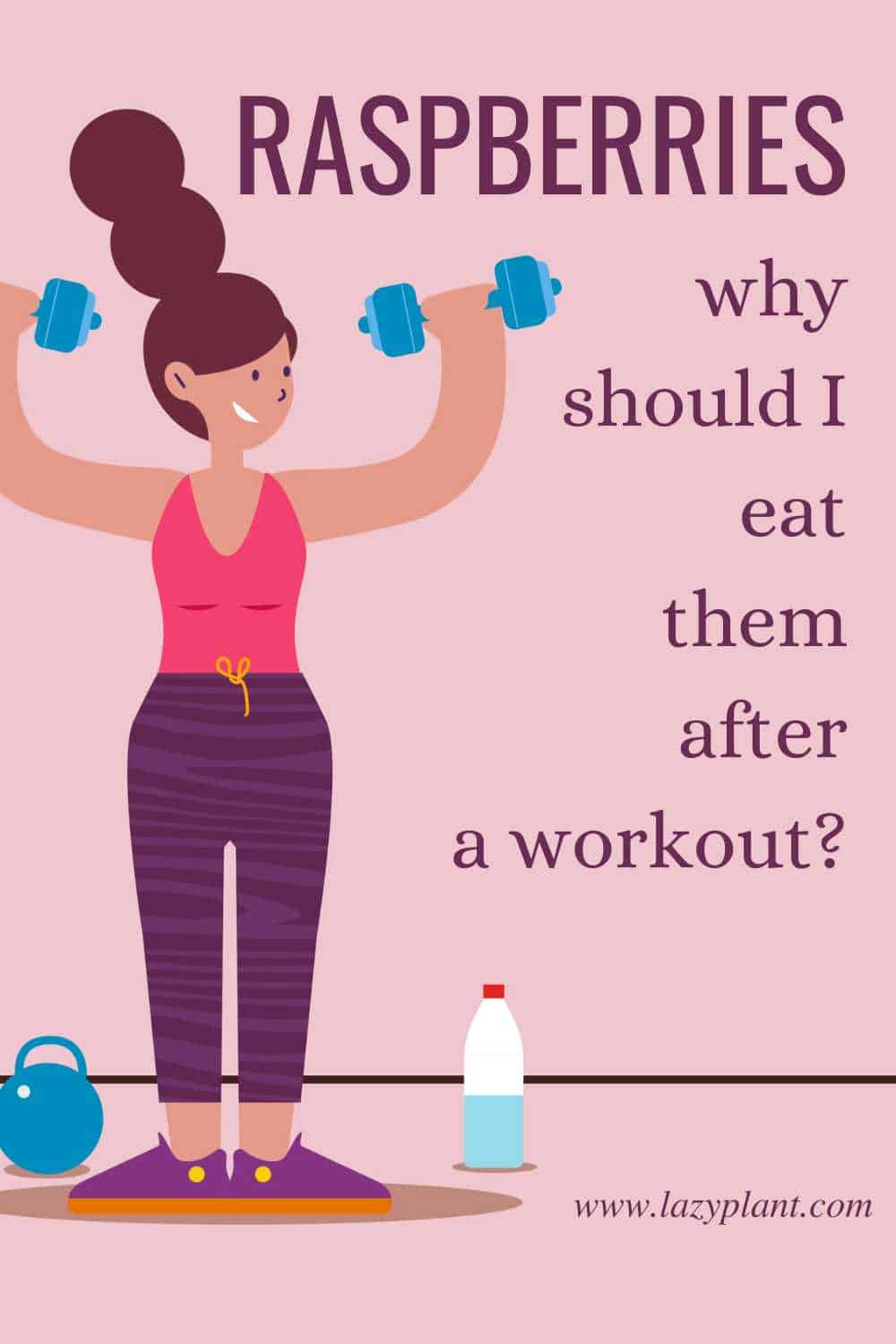
Moreover, raspberries are one of the few foods high in raspberry ketones, which are believed to aid in fat loss, particularly around the belly. These ketones help in breaking down fat cells, making them an ideal food for athletes during the cutting phase.[35]
Raspberries also provide hydration, which is essential after exercise. Being 85% water, raspberries help replenish lost fluids, while the electrolytes, particularly magnesium and potassium, play a role in maintaining muscle function and fluid balance. Proper hydration aids in muscle recovery, reduces cramps, and improves overall performance. For athletes, maintaining electrolyte balance is crucial, and consuming raspberries post-exercise can help in replenishing these vital nutrients.
Finally, raspberries are a good source of folate, which plays a significant role in muscle growth and strength. Folate also aids in regulating homocysteine levels, which may rise during strict, low-calorie diets. For athletes in a cutting phase, raspberries can provide essential folate, supporting both performance and cardiovascular health.[36,37,38]
In contrast, the worst time of the day to eat raspberries is right before exercise. Due to their high fiber content, raspberry consumption right before exercise may cause discomfort, or stomach disturbances, such as bloating, gas, or even pain.
Does cooking affect the nutritional value of raspberries?
The nutritional value of raspberries can be affected by cooking, but the extent of these changes depends on the cooking method and duration.
Raspberries are sensitive to heat. Some vitamins and antioxidants may be partially degraded during cooking.
For instance, vitamin C is heat-sensitive and can degrade with prolonged exposure to high temperatures.
While some heat-sensitive compounds may be affected, other antioxidants like anthocyanins (responsible for the red color of raspberries) may remain relatively stable during cooking.
The fiber content of raspberries is generally stable during cooking as well.
To preserve the maximum nutritional content, consider using minimal cooking methods such as light steaming, quick blanching, or incorporating fresh raspberries into dishes.
In any case, incorporating raspberries into your diet, whether fresh or cooked, contributes valuable nutrients and antioxidants to your overall nutrition.
Can raspberries make me fat?
Eating raw raspberries in moderation as part of a balanced diet is unlikely to contribute to weight gain.
Sweetened raspberries, raspberry juice, or raspberry foods with added sugar can make you fat, though, as they can easily lead to overconsumption.
Moreover, as raspberry juice, jams, or sauces may lack fiber, they don’t regulate appetite. Consume these foods only sparingly in small amounts.
